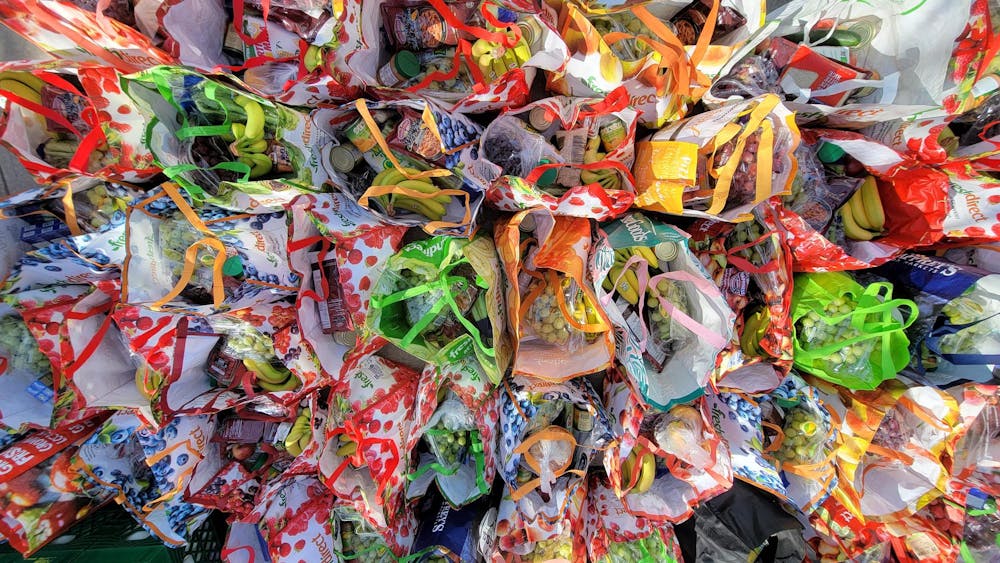At 2:30 p.m. on Tuesday — three days after the Trump administration said it would halt funding for Supplemental Nutrition Assistance Program (SNAP) benefits received by more than 40 million Americans — volunteers with the Princeton Kindness Food Project bustled in and out of a dim storage room, cluttered with a humming refrigerator and stacks of food trays.
Community members lined the driveway of the Princeton YMCA, choosing from an array of Terhune Orchard pies, fresh produce, pre-packaged meals, and ziplock bags of bread. Many had arrived right at 2:30 p.m., when food pick-ups began.
As SNAP benefits remain in limbo amid the ongoing government shutdown, food pantries and food banks across Princeton are bracing for a surge in demand. A federal judge ordered the Trump administration to fully fund benefits for November on Thursday, but questions over how much recipients will receive and when they will see the aid remain.
The uncertainty “hasn’t hit this little corner in Princeton yet,” Lois Hilimire, a volunteer for the Princeton Kindness Project, told The Daily Princetonian. However, she emphasized that the group, which serves an estimated 100 people a week, is focused on keeping a steady supply of food from donating farms and local businesses amid the shutdown.
“We were afraid that TASK [Trenton Area Soup Kitchen], who provides the hot trays, would have to cut back, because they have a central facility, and more people would be calling on them,” Hilimire said. She added that luckily, this did not seem to be affecting Princeton Kindness Food Project’s food supply.
President of Send Hunger Packing Princeton (SHUPP) Ross Wishnick told the ‘Prince’ that the organization has not seen a significant increase in demand for food since SNAP funding was paused. However, he noted that SHUPP received more food than usual from Mercer Street Friends, one of their regular providers, likely anticipating an increase in demand.
“The reason we’re getting so much food from Mercer Street Friends is that the Governor allocated about $42 million of state monies for food distributors — pantries and banks — to pick up the slack that the federal government should be doing,” Wishnick said.
Alongside an increase in the supply of food, Amy Lansky, the president of the Princeton Mobile Food Pantry, said that she has seen an increase in support from the local community.

“Many people have reached out to us and asked how they can support us,” Lansky told the ‘Prince.’ “We also have had every[one] from churches and gyms and restaurants and the local school systems — everybody has asked me how they can support us.”
“It’s been really wonderful. We’re very fortunate that we live in a community like Princeton, where there are so many organizations who will be able to support our families,” Lansky added.
Other food organizations like Arm in Arm, which operates across New Jersey, have seen a marked increase in people visiting their pantries. “We’ve estimated that we will see 250 new families per week which will cost us $50,000 per month to sustain,” Arm in Arm wrote on Facebook.
“They’re anticipating serving about 250 more families than normal, which obviously is a financial and time burden,” said Ingrid Nilsson ’26, who coordinates campus volunteers for Arm in Arm. Currently, Nilsson is trying to recruit more volunteers by promoting opportunities in group chats and collaborating with other clubs to organize food drives.

The Princeton Mobile Food Pantry, which packs groceries and delivers them directly to residents’ doorsteps, is preparing to fill more than 360 orders next week — a major increase from 265 at the same time last year. Still, Lansky cautioned against attributing the increase entirely to the SNAP funding freeze.
Nilsson agreed, noting that demand typically increases as the holidays approach. “In my experience as a volunteer, [Arm in Arm] always seemed busier around Thanksgiving in November,” she said.
Wishnick said that uncertainty over whether rulings challenging the withholding of SNAP benefits will be obeyed has pushed SHUPP to prepare for the worst. This uncertainty, alongside the reduction of fresh produce available as winter approaches, has put food pantries in a difficult position.
According to Wishnick, volunteers would keep an eye on how fast pantries are depleting, and adjust accordingly. “We don’t know whether or not our government will adhere to the judge’s orders … therefore, we’re all gearing up to help,” he told the ‘Prince.’
“[Food] will be reduced in the winter, because the farms won’t be producing that much. So we never know what’s going to come, and then we may just supplement it with our own personal contributions just to keep the program going,” Hilimire said.
On campus, Arm in Arm takes donations at the food pantry located in the basement of 61 Nassau St.
“It’s right on campus, if people have packaged foods or extra snacks that they’re not going to use,” Nilsson said.
Sena Chang is a senior News writer and Features contributor for the ‘Prince.’ She typically covers town topics and campus unions. She can be reached at sc3046[at]princeton.edu.
Please send any corrections to corrections[at]dailyprincetonian.com.








